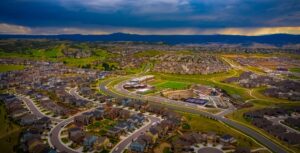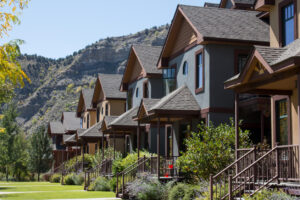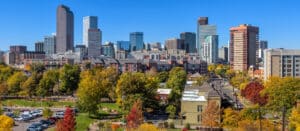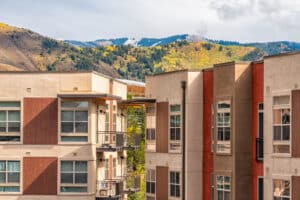Max Nardo, SWEEP | Housing Forward Colorado
James Flattum, Greater Denver Transit
Key Takeaways:
- A transportation mode shift away from cars is required for Colorado to achieve its sustainability and affordability goals.
- A new law expands tools to provide ~$7 per month apartment-based transit passes. These can help us cut pollution, save money, and get more out of existing investments in transit and housing.
- A variety of inexpensive policies can accelerate adoption.
Background
In the 1990s, RTD launched its EcoPass program, offering unlimited transit passes in bulk at significant discounts to businesses, neighborhoods, apartment buildings, and colleges. The program has grown in popularity, with some of the largest regional entities such as the University of Colorado Boulder, the City and County of Denver, and DaVita, providing EcoPasses to their students and employees as a benefit and cost-effective strategy to reduce traffic, pollution, and parking demand while increasing transit use.
Compared to the Business Ecopass program, the Neighborhood EcoPass (NECO) program – available for apartment buildings and neighborhoods – has been less successful despite costing 90% less than the standard monthly RTD pass. To address this low uptake, the Colorado legislature passed Senate Bill 25-161, which aims to make EcoPasses a standard amenity in apartment buildings.
In this piece, we’ll explore the benefits of RTD’s NECO program and the opportunities created by SB 25-161 to expand participation, thereby increasing access to low-cost public transportation in the Denver region. To understand why this matters now, we’ll first look at how this fits into Colorado’s climate and housing goals.
Housing and climate context
Colorado’s climate and housing affordability plans depend on creating more compact, mixed-use communities with a greater diversity of housing types in more walkable and transit-friendly neighborhoods. Recent policy changes at the state and local level to legalize construction of more homes near transit and remove costly parking mandates have created an opening for this type of climate-friendly, affordable growth.
Having housing near transit is a necessary step, but we will achieve these goals only if people actually use transit. The state projects that hitting our climate goals will require doubling the share of transit, biking, and walking trips over the next decade. The Colorado Department of Transportation (CDOT) has adopted goals to reduce transportation emissions 60% by 2037 and per-person driving by 1% per year.
Unfortunately, transit ridership has struggled to recover from pandemic lows. However, there is reason for hope. Ridership is closely linked to the level and frequency of transit service provided by RTD. After cutting service down to 60% of 2019 levels during the pandemic, RTD has gradually increased bus and rail service by nearly 25% since then.
Transportation sector lagging in decarbonization under current policy
Source: Colorado Transportation Vision 2035
SB 25-161 strengthens an existing RTD tool to boost transit ridership
RTD already offers NECO passes at a steep bulk discount. The numbers are striking: a standard individual transit pass costs $88 per month — but under the program, NECO passes are $125 per household per year, or roughly $7 per person per month. That’s a 92% discount.
Source: SWEEP
Research shows that RTD’s EcoPass holders ride transit five times more often than non-holders (City of Boulder, p.25). That’s not a marginal shift; it is the magnitude of change needed to truly move the needle. Pilot programs in peer metro areas have shown similarly strong results: Minneapolis-St. Paul renters with Residential Passes use transit 50% more often, and those who did not previously have a monthly pass took 78% more rides over just the first 6 months. These outcomes have compelled other cities to adopt similar neighborhood or apartment-based transit passes, including Salt Lake City’s Hive Pass, Seattle’s ORCA Multifamily Passport, and Portland’s Transportation Wallet for residents of affordable housing.
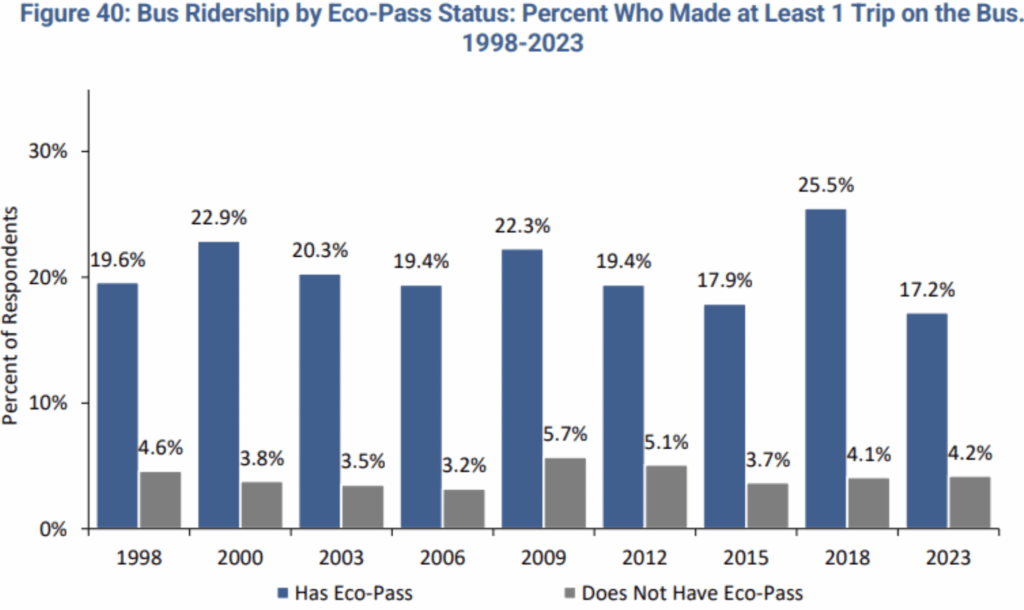
Despite low costs and impressive results, RTD’s program remains little-used. As of August 2025, only 67 apartments or neighborhoods in the RTD region participate. 53 of these are in Boulder, where local policies have helped drive adoption (more on this below).
SB 25-161 aims to increase NECO pass uptake by:
-
- Directing RTD to set performance targets for NECO pass enrollment (e.g. X apartment buildings or Y households by 2028).
-
- Requiring managers of apartment buildings to survey their residents and enroll properties in the NECO pass program if a majority of respondents support it. This is required by June 30, 2026, and applies to large apartment buildings with 50+ units in areas well served by transit as defined by the Department of Local Affairs’ HB24-1304 maps (see below). RTD will provide a survey tool.
-
- Directing RTD to streamline enrollment and compensate apartment managers for administrative work.
-
- Requiring RTD to conduct outreach to apartments in transit-served areas, in partnership with the Denver Regional Council of Governments (DRCOG) and Transportation Management Associations (TMAs).
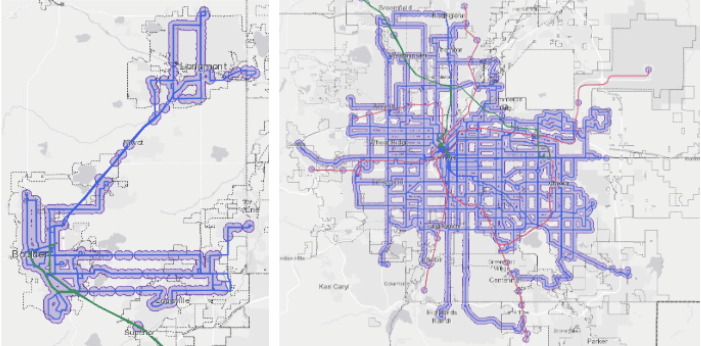
The SB 25-161 NECO Pass survey requirement applies to all large apartment buildings within ¼-mile of RTD transit stops with service every 30 minutes or better. This applies not only to rail stations but also to frequent bus stops, meaning the policy covers the vast majority of apartment buildings with 50 or more units in the Denver metro area.
In short, the program will now be more visible and easier to use.
The case for more investment in NECO passes
For a 100-unit building with 150 residents, NECO passes cost $12,500 per year. This is less than what a typical household spends on transportation in a year ($13,174, Bureau of Transportation Statistics) and comparable to the annual cost to own and operate a car ($12,296, USDOT). It is also about one-third the cost of building a single parking space in a parking garage.
Passes can be paid for by apartment management companies, residents, or governments. Regardless of who pays, the net benefits easily outweigh the costs:
-
- Residents save money. Individuals cannot buy a $7 monthly pass on their own; that price is only available through the bulk discount. Anyone who would otherwise purchase a pass saves approximately $81 per month. Even occasional transit users break even with just a few avoided parking costs, gas fill-ups, or airport trips on the A line. If one single household in a 100-unit building downsizes from 2 cars to 1, those savings alone would be roughly equivalent to the annual cost of NECO passes for the whole building.
-
- Developers save money and attract tenants. Parking is wildly expensive to build; underground parking structures cost $33,000-$50,000 per parking stall. Forgoing even one single parking spot would save a developer enough money to pay for three years of transit passes for the entire building ($37,500). And doing so has just become possible; at least 21 local governments representing over 2 million Coloradans have eliminated minimum parking requirements for apartments near transit since last summer, following the passage of HB24-1304 (per SWEEP’s Housing Forward Colorado campaign tracking).
-
- Transit providers gain stable revenue and ridership. Predictable revenue and a wider ridership base feed back into RTD’s ability and incentive to provide frequent service.
-
- Neighborhood and regional benefits. Fewer cars mean less traffic, less competition for parking, and cleaner air. The Denver region has spent nearly $6 billion over the last couple of decades building out the FasTracks rail and Bus Rapid Transit systems, and EcoPasses are a cost-effective way to increase ridership and get a better return on our investment. This aligns with regional goals from DRCOG to grow transit ridership by 63% in the coming decades.
Few investments so directly and efficiently advance Colorado’s climate, affordability, and mobility goals at the same time.
Policy options to support NECO pass uptake
So why aren’t more apartments already doing this? Because the decisions are made by individual apartment managers, who sign the contracts and pay the $125 per year for each household. Even when the overall benefits add up, the individual property’s financial incentives don’t always reflect that value. Policy support can bridge that gap.
Financial support. Small government investments can go a long way. $1 million could fund passes for 80 buildings consisting of 8,000 apartments (about 12,000 people). If the support is distributed as a 50% subsidy, twice as many people are included. This could be done on a short-term basis to allow properties and residents to try out the program before deciding whether to continue.
The state could support this with funding from the Clean Transit Enterprise or Nonattainment Area Air Pollution Mitigation Enterprise, or by making it an eligible use for the Alternative Transportation Options Tax Credit, a 50% credit that’s currently only available for RTD’s Business EcoPass program.
Targeting support to affordable housing properties is especially powerful. Households in the lowest 20% income tier spend 30% of income on transportation, compared to 15% for an average household. RTD research from 2020 found that 61% of low-income households in apartments near transit have no car, and 63% ride the bus once a week or more.
Transportation demand management (TDM). Many cities already require developers to support alternatives to driving and mitigate impacts of extra cars on nearby neighborhoods by providing things like bike parking, shared mobility stipends, or even showers for people who bike to work. Transit passes rank as inexpensive and effective among these options. Policymakers can require or strongly incentivize them, while offsetting costs with reductions in other fees. In the context of development costs in the tens of millions and public impact fees that run into the millions to fund infrastructure and housing, the cost of providing transit passes is negligible.
Local examples. The City of Boulder has achieved its high participation in NECO by requiring most new apartment buildings to provide passes for the first three years of operation. Under Boulder’s program, developers pay the full cost for 3 years, then if they wish to continue, the city will pay a 30% share on an ongoing basis, with a higher match if affordable units are included. Many properties have continued to provide NECO passes after year 3. Meanwhile, Boulder County covers passes for all residents in its housing authority properties. Towns have also implemented community-wide versions, including Nederland (funded with a voter approved property tax) and Lyons.
These examples show how this policy is flexible and scalable. With an estimated 300,000 people in the region living in apartment buildings of 50 or more units, targeting pass programs here would have a big impact.
Apartment managers can act now. While more policy support can accelerate adoption, the opportunity is here today and has become more favorable with streamlined enrollment and compensation for staff time spent signing up. Even without further subsidies or mandates, enrolling a building can immediately offer a valuable amenity to residents and can help a building stand out at a time when the recent multifamily construction boom has elevated vacancy rates and given renters more options. Enrollment will be required by law if building residents support it in the survey, and enrolling now avoids that process entirely.
Unlocking the full value of our investments
Metro Denver has collectively spent billions on its rail and bus system and billions more constructing apartment buildings near them. Apartment-based transit passes are a missing piece that can ensure these investments deliver as intended. For pennies on the dollar compared to other transportation costs, this program can save households money, reduce traffic, cut emissions, and help transit thrive. With parking reforms taking effect and a record number of new apartment buildings opening across the region, now is the perfect time to move forward on NECO bulk transit passes.


